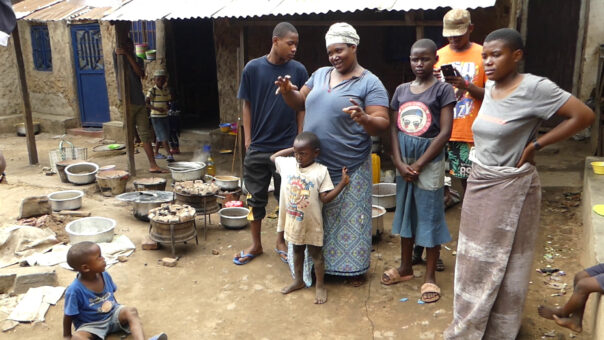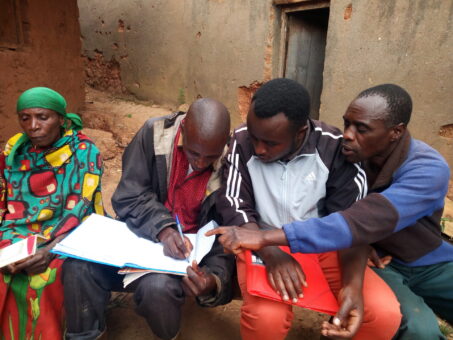The story of Rose from Burundi who, thanks to a community microcredit project, has opened up her own restaurant. Rose lives in Burundi and has six children. A few years ago she opened her own restaurant where she prepares meals which she also delivers to customers beyond her village. Thanks to this activity she has been able to send her children to school and even pay a number of employees a salary.  Thirteen years ago, however, the situation was very different. Rose did not understand the meaning of the word “savings” and struggled to manage her family’s finances. Everything changed when she got to know the “It can be done!” project, facilitated by AMU, Azione per un Mondo Unito, and Casobu, a Burundian NGO and local partner. “Through this project,” explains Rose, “we learned how to save money. I was put in touch with a group of people who, like me, needed money to improve their situation. When I received the first loan I immediately bought some clothes because I didn’t know how to make a proper investment. Then I said to myself: how can I take the money without having a concrete project? So I decided to buy pots, dishes and pans. And that’s how I opened my restaurant.”
Thirteen years ago, however, the situation was very different. Rose did not understand the meaning of the word “savings” and struggled to manage her family’s finances. Everything changed when she got to know the “It can be done!” project, facilitated by AMU, Azione per un Mondo Unito, and Casobu, a Burundian NGO and local partner. “Through this project,” explains Rose, “we learned how to save money. I was put in touch with a group of people who, like me, needed money to improve their situation. When I received the first loan I immediately bought some clothes because I didn’t know how to make a proper investment. Then I said to myself: how can I take the money without having a concrete project? So I decided to buy pots, dishes and pans. And that’s how I opened my restaurant.”  “It can be done!” is a project based on community microcredit, a methodology through which groups of people get together and self-finance by putting their savings into a common fund. In this way the group can grant small loans to individual members enabling them to meet certain expenses and supporting them in starting up or managing small income-generating activities. As Emanuela Castellano, who manages the project on behalf of AMU, explained: “Community microcredit projects are based on a participatory approach which aims to empower group members so that the project can go ahead and grow. Funds raised and our support are used to raise awareness within the communities, train and accompany group members but the money put in common is theirs. The project’s main feature is the call for reciprocity whereby each person can contribute to developing the community. So the “You can do it!” project also seeks to provide support for activities that are growing and in need of more substantial funding for expansion.” Since Rose heard about the project she has been able to realise her dream of opening a business that would enable her to support her children and put them through school. The number of clients has increased over time, and now she can even pay five employees to help her. They, too, have plans for the future. One of them would like to buy a goat, another a plot of land. Initially every dream seems difficult to realize, especially in a country like Burundi. It is the second most densely populated country in Africa and one of the top five countries in the world with the highest rate of poverty. Here, one in two families, around 4.6 million people, suffers from food insecurity and 56% of children under 5 are malnourished. In such a complex landscape, Rose’s restaurant is truly the realization of a dream, and can also become a sign of hope for her children and employees to realize their dreams. The “It can be done!” project does just that. It provides hope for others, like Rose, to realise their dreams and look forward to a better future.
“It can be done!” is a project based on community microcredit, a methodology through which groups of people get together and self-finance by putting their savings into a common fund. In this way the group can grant small loans to individual members enabling them to meet certain expenses and supporting them in starting up or managing small income-generating activities. As Emanuela Castellano, who manages the project on behalf of AMU, explained: “Community microcredit projects are based on a participatory approach which aims to empower group members so that the project can go ahead and grow. Funds raised and our support are used to raise awareness within the communities, train and accompany group members but the money put in common is theirs. The project’s main feature is the call for reciprocity whereby each person can contribute to developing the community. So the “You can do it!” project also seeks to provide support for activities that are growing and in need of more substantial funding for expansion.” Since Rose heard about the project she has been able to realise her dream of opening a business that would enable her to support her children and put them through school. The number of clients has increased over time, and now she can even pay five employees to help her. They, too, have plans for the future. One of them would like to buy a goat, another a plot of land. Initially every dream seems difficult to realize, especially in a country like Burundi. It is the second most densely populated country in Africa and one of the top five countries in the world with the highest rate of poverty. Here, one in two families, around 4.6 million people, suffers from food insecurity and 56% of children under 5 are malnourished. In such a complex landscape, Rose’s restaurant is truly the realization of a dream, and can also become a sign of hope for her children and employees to realize their dreams. The “It can be done!” project does just that. It provides hope for others, like Rose, to realise their dreams and look forward to a better future.
Laura Salerno
https://www.youtube.com/watch?v=t0W6a2khA3Q




0 Comments